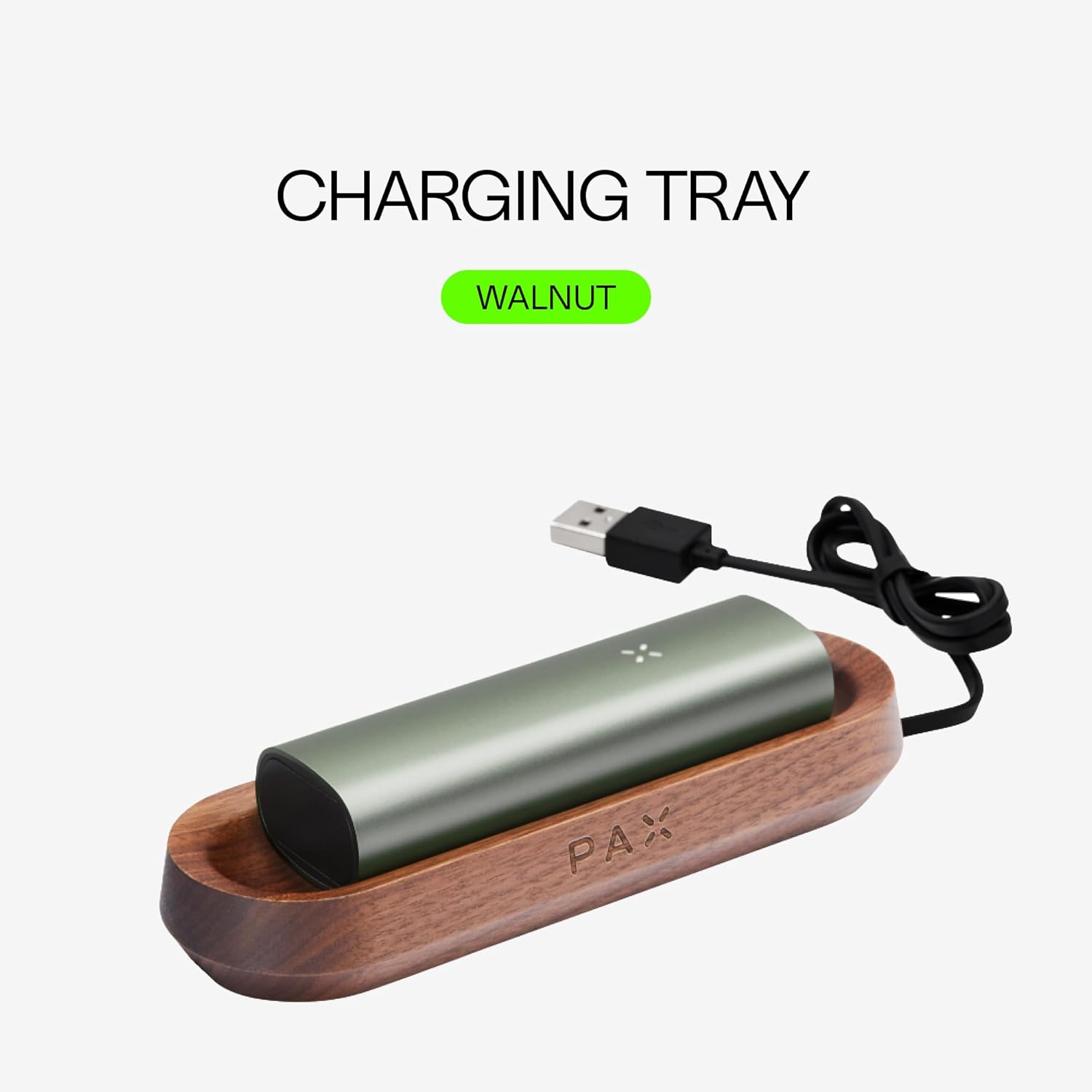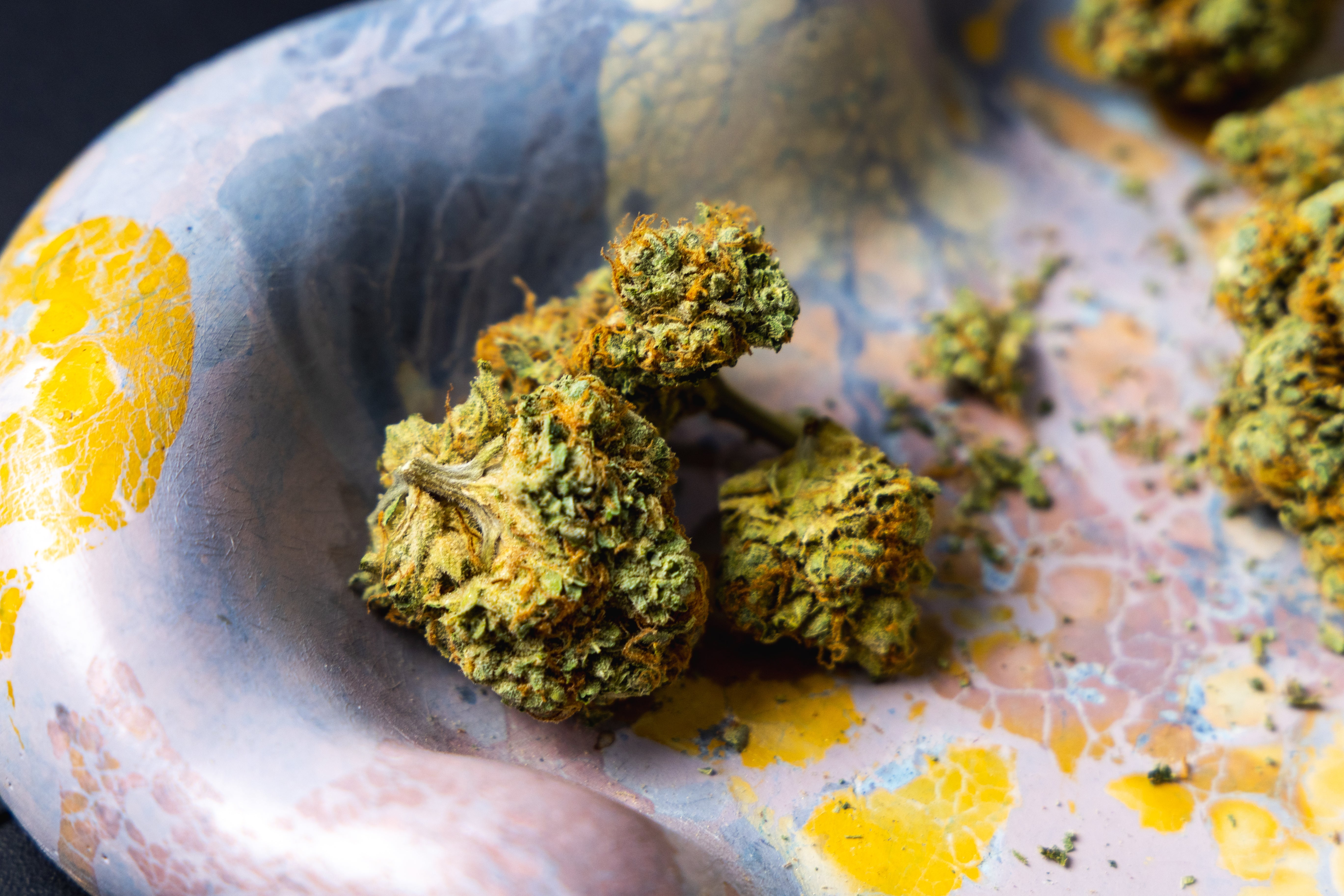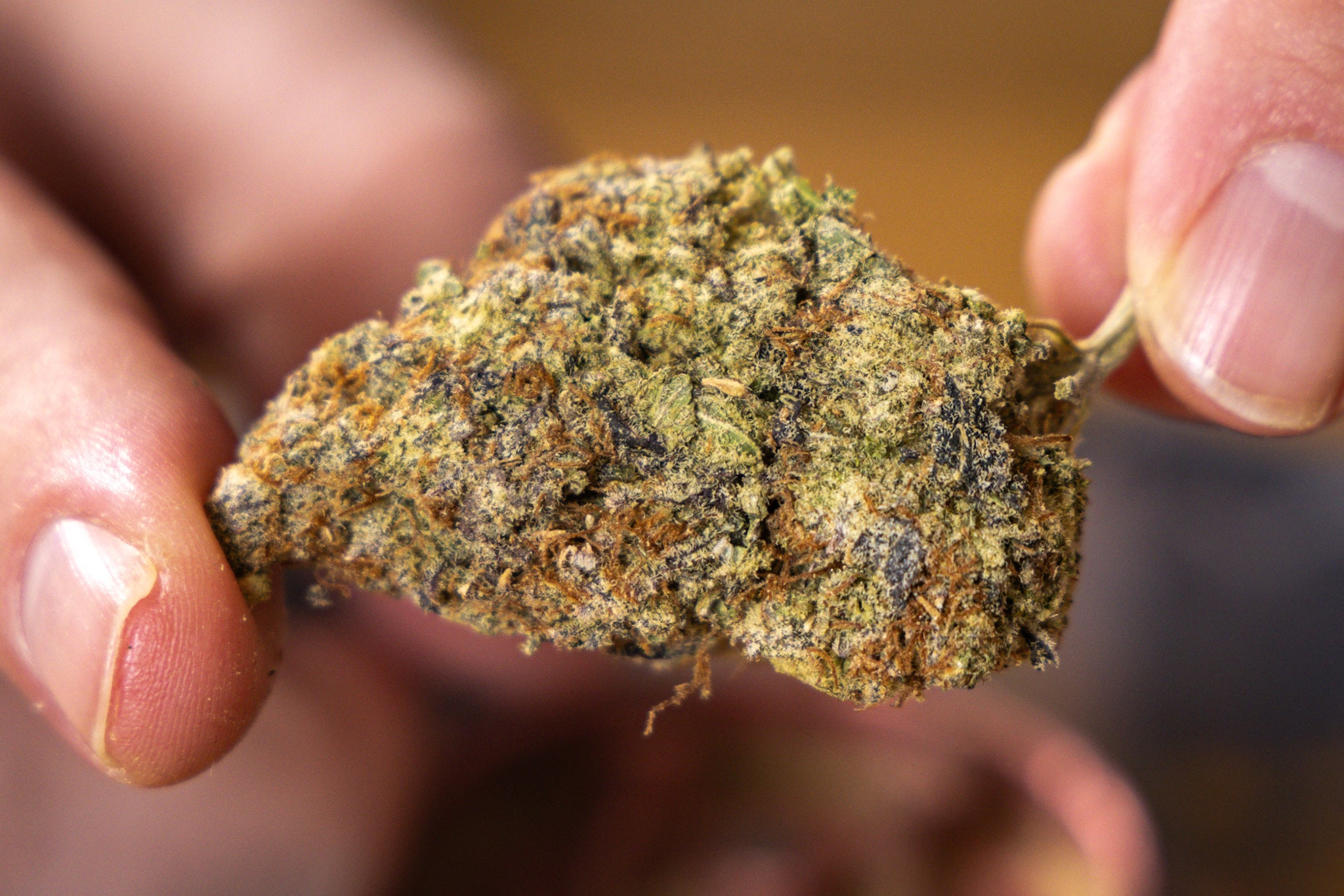THC or CBD for Fibromyalgia: Which Cannabinoid Is More Effective?
Living with fibromyalgia can be a daily struggle, filled with pain, fatigue, and uncertainty. If you're grappling with this challenging condition, you may have heard about the potential benefits of cannabis-derived compounds. The question of whether to use THC or CBD for fibromyalgia has become a hot topic in recent years, as more people seek natural alternatives to manage their symptoms.
Both of these cannabinoids have shown promise in alleviating various aspects of fibromyalgia, but which one might be more effective for you or do you need both?
Written by Rowan Bailey
Published on 30th July 2024
*Disclaimer*
We cannot discuss medical claims with regards to CBD. We regularly get asked by our customers so try to provide the best information we can whilst navigating this strict landscape that we fully support. We link to and quote from studies below, but it is vital to do your own research and to keep an eye out for recent studies.
As you navigate the complex world of fibromyalgia treatments, it's crucial to understand the differences between THC and CBD. We'll explore how each compound interacts with your body and potentially affects fibromyalgia symptoms.
You'll learn about the pros and cons of using THC or CBD for fibro, including their supposed effects on pain, sleep, mood, and overall quality of life. By the end of this article, we hope to have helped you have a clearer picture of which cannabinoid might be better suited to your needs and how to approach these treatment options here in the UK.

Understanding THC and CBD
When exploring the potential benefits of cannabis for fibromyalgia, it's crucial to understand the two main cannabinoids that are focused on: THC and CBD. These compounds interact with your body in different ways, potentially offering relief from various symptoms and different ratios of these two compounds can dial things in more specifically to your needs. Many prescribing doctors will be looking to find that balance between THC/ CBD to suit your needs. Many of which will start with a 1:1 ratio of CBD to THC for example.
- What is THC?: THC, or tetrahydrocannabinol, is the primary psychoactive component in cannabis. It's responsible for the "high" sensation often associated with cannabis use 1. THC interacts with specific receptors in your brain, triggering the release of dopamine and which can alter your perception of time and sensory experiences at first or with low tolerances 1.
When you consume THC, it can affect various parts of your brain:
1. The hippocampus, impacting memory formation.
2. The cerebellum and basal ganglia, influencing balance and coordination.
3. Areas responsible for judgment and information processing.
THC may have potential medicinal effects for conditions such as pain, nausea, reduced appetite, and insomnia 1.
What is CBD?: CBD, or cannabidiol, is another prominent cannabinoid found in cannabis plants. Unlike THC, CBD doesn't produce a "high" and is considered non-psychoactive in this regard 2. It's often derived from hemp, a variety of cannabis with low THC contents though this isn't always the case as new strains appear with higher CBD content for efficient extract practices alongisde THC 3.
CBD has gained attention for its potential therapeutic benefits, including:
1. Reducing anxiety
2. Improving sleep health
3. Managing chronic pain
4. Treating epilepsy syndromes 2.
The World Health Organization reports that CBD doesn't show signs of abuse or dependence potential in humans 2.
How do they interact with the body?: Both THC and CBD interact with your body's endocannabinoid system, but in different ways:
THC binds directly to cannabinoid receptors, particularly CB1 receptors in the brain, leading to its psychoactive effects 4.
CBD's interaction is less direct. It may increase the effects of other cannabinoids or bind to receptors that researchers haven't fully identified yet 4.
These interactions are believed to lead to various effects on your body (Though further research is needed for definitive results):
1. Pain relief
2. Reduced inflammation
3. Altered mood and anxiety levels
4. Changes in appetite and sleep patterns 4.
It's important to note that while both compounds have potential therapeutic uses, they can also cause side effects. THC, for instance, may increase heart rate and impair coordination 1. CBD, on the other hand, is generally well-tolerated but may interact with certain medications 2.
As you consider using THC or CBD for fibromyalgia, remember that everyone's body responds differently to these compounds. It's crucial to consult with a healthcare professional to determine the most appropriate approach for your specific needs and circumstances.

R Bailey
I work as a consultant in the CBD and medical cannabis industry whilst also being a medical cannabis patient myself for my Fibromyalgia. I have been in the industry since 2018, and a patient since 2020. Along my journey I have provided educational talks to support groups for fibro across south west Wales, whilst also working in CBD Labs developing products specifically for fibro and other issues.
THC for Fibromyalgia symptoms
When you're dealing with fibromyalgia, finding effective relief can be a challenging journey. THC, the psychoactive compound in cannabis, has shown promise in managing various symptoms associated with this condition. So let's explore how THC might help you cope with some of the most common fibromyalgia symptoms.
Pain Relief
One of the primary reasons you might consider THC for fibromyalgia is its potential to alleviate/ manage pain. Studies have shown that THC can have significant pain-relieving effects. In a 2007 study involving 40 fibromyalgia patients, a synthetic cannabinoid similar to THC demonstrated notable pain relief. Approximately 43% of participants reported strong pain relief, while another 43% experienced mild pain relief 5.
Another study compared the effects of different cannabis formulations on pain thresholds. Interestingly, subjects who received treatments containing high levels of THC experienced an increase in their pain threshold compared to those who received a placebo. In contrast, formulas containing only CBD with zero traces of THC or other compounds such as CBG/ CBN didn't provide significant pain relief 5.
Sleep Improvement
If you're struggling with sleep issues due to fibromyalgia, THC might offer some help. A 2018 review by the National Academies of Sciences, Engineering, and Medicine found moderate evidence supporting the use of cannabis-related products for improving sleep in people with fibromyalgia, at least in the short term 5.
Further supporting this, a 2010 study investigated the effects of nabilone, a synthetic drug similar to cannabis. The researchers discovered that nabilone helped improve sleep among people with fibromyalgia 5.
Mood Enhancement
THC may also have a positive impact on your mood, which can be particularly beneficial if you're dealing with the emotional toll of chronic pain. Studies have shown that THC can positively affect mood regulation 6. This mood-enhancing effect, combined with potential improvements in sleep quality and pain reduction, could contribute to an overall better quality of life.
It's important to note that while these findings are promising, the evidence supporting the use of THC for fibromyalgia is still considered low-quality by some researchers 6. The effects can vary from person to person, and more research is needed to fully understand the long-term impacts and optimal usage.
When considering THC for fibromyalgia symptom management, keep in mind that it can be consumed in various forms, including dry herb vaping, edibles, oils, and capsules 5. Each method of consumption may affect you differently, so it's crucial to consult with a healthcare professional to determine the most appropriate approach for your specific needs.




CBD for Fibromyalgia symptoms
As you explore options for managing fibromyalgia symptoms, you might be curious about the potential benefits of CBD. Cannabidiol, or CBD, is a compound derived from cannabis that has gained attention for its potential therapeutic effects which are being studied across the world. Unlike THC, CBD doesn't produce a "high" and is being studied for its possible role in pain management and other health concerns 7. By avoiding the 'high' or balancing it with a ratio between THC and CBD, you can manage things day to day without any impairment.
Anti inflamatory effects
One of the key ways CBD is theorised to help with fibromyalgia symptoms is through its anti-inflammatory properties. Research suggests that CBD can interact with your body's endocannabinoid system, which plays a role in regulating pain sensation and inflammation 8. This interaction may help reduce pain sensitivity, which is a common issue for those with fibromyalgia. So it's no wonder it's been a popular alternative to much stronger prescribed pain killers such as opiates.
A 2016 study proposed that a lack of endocannabinoids might be at the root of chronic pain syndromes, including fibromyalgia 7. By using CBD, you might be able to address this deficiency, potentially enabling your body to do a better job at managing chronic pain. In fact, a review of studies found that CBD may help relieve pain and inflammation in various conditions linked to chronic pain, including fibromyalgia 7. Though it is vital to understand that these studies are still needed for more defintiive results.
Fibromyalgia anxiety reduction
Living with fibromyalgia can be stressful, and many people experience anxiety as a result of it's impact. The uncertainty it gives me day to day has made things that most people take in their stride a point of stress or anxiety for me. So it's no wonder that when you hear CBD can help with this, that those with Fibro want to jump at the chance to try it out.
Early stage studies have shown that CBD has promise in reducing anxiety symptoms, which could be beneficial for your overall well-being. Research has demonstrated CBD's anti-anxiety properties in both human and animal studies 9.
One review found that CBD doses ranging from 6 mg to 400 mg were effective in treating various anxiety disorders (9.) though it's important to read the recommendations of daily dose limits to stay compliant and safe.
By potentially reducing anxiety, CBD might help you manage the emotional aspects of living with fibromyalgia more effectively.
Neuroprotective propterties
While there isn't specific research on CBD for fibromyalgia-related cognitive issues (often referred to as "fibro fog"), some studies suggest that CBD and other cannabinoids may have neuroprotective effects 8. This means CBD might help protect your brain fog or other limitations, which could potentially benefit your cognitive function.
CBD's interaction with the endocannabinoid system has been shown to have neuroprotective and antioxidant effects, which could be beneficial in treating neurological disorders 10 if true. While more research is needed to fully understand how this relates to fibromyalgia specifically, these properties suggest potential benefits for overall brain health.
In addition to these specific areas, CBD may also help improve sleep quality, which is often disrupted in people with fibromyalgia. A 2023 study found that participants taking 50mg of CBD daily experienced significant improvements in sleep quality after eight weeks 9. Another clinical trial revealed that 150 mg of CBD administered nightly improved sleep after two weeks compared to a placebo 9.
It's important to note that while these findings are promising, more high-quality research is needed to fully understand CBD's effects on fibromyalgia symptoms. A 2023 review of studies investigating CBD for pain found that while cannabinoids reduced pain, the evidence was not of high quality due to the limited number of randomized controlled trials 9. However, the review did note positive effects on quality of life and improvements in associated issues such as sleep quality, mood, and libido 9.
98% of customers would recommend this CBD balm after trying it
All natural & soothing
Conclusion on THC vs CBD for Fibro
The exploration of THC and CBD for fibromyalgia management sheds light on promising avenues to address this complex condition. Both cannabinoids show potential in easing pain, improving sleep, and enhancing overall quality of life, albeit through different mechanisms. THC's direct interaction with cannabinoid receptors may offer more immediate relief, while CBD's anti-inflammatory properties could provide a gentler approach to symptom management.
As research in this field continues to grow, it's clear that personalized approaches are key to finding effective relief. To make an informed decision, it's crucial to weigh the benefits and potential side effects of each compound, considering your specific symptoms and lifestyle. Talking with a healthcare provider can help tailor a treatment plan that aligns with your needs, potentially incorporating these cannabinoids as part of a comprehensive strategy to manage fibromyalgia.
CBD Products For Fibromyalgia FAQ
References
[1] -https://www.healthline.com/health/effects-of-cannabis-on-body
[2] -https://www.health.harvard.edu/blog/cannabidiol-cbd-what-we-know-and-what-we-dont-2018082414476
[3] - https://www.healthline.com/health/your-cbd-guide
[4] - https://www.medicalnewstoday.com/articles/325871
[5] - https://www.healthline.com/health/fibromyalgia/marijuana-fibromyalgia
[6] - https://www.ncbi.nlm.nih.gov/pmc/articles/PMC10295750/
[7] - https://www.medicalnewstoday.com/articles/321501
[8] - https://neurogan.com/blogs/news/cbd-for-fibromyalgia
[9] - https://savagecabbage.co.uk/can-i-use-cbd-for-fibromyalgia/
[10] - https://www.ncbi.nlm.nih.gov/pmc/articles/PMC10586905/

Written by Rowan Bailey
CBD lab geek, medical cannabis patient and consultant.
More related posts

Fibromyalgia, an interview with a support group member

What strength CBD Oil for Fibromyalgia?

Medical Cannabis Fibromyalgia Study Results





